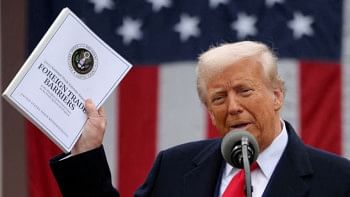External pressures will remain despite IMF loan payout

The International Monetary Fund's $689 million second instalment of the $4.7 billion loan will give a much-needed boost to the country's foreign currency reserves but pressures on the country's external position will remain, said Moody's Investors Service.
On December 12, the IMF board approved the first review of Bangladesh's programme, which allows for the disbursement of the credit under the Extended Credit Facility, the Extended Fund Facility and the Resilience and Sustainability Facility.
"We expect the disbursement to shore up Bangladesh's foreign-exchange reserves, which have eroded significantly over the past two years amid a challenging external environment," Moody's said on Friday.
Net foreign exchange reserves were $15.6 billion, which can provide import coverage for 2.5 months, in November, down from $21.1 billion at the end of 2022-23, and have been on a downward trend since mid-2021.
While higher global commodity prices contributed significantly to current account pressures, wider deficits in the financial account added to the stress given tepid foreign direct investment inflows and lower trade credit inflows. At the same time, Bangladesh Bank's efforts to preserve the value of the taka through sales of dollars further contributed to pressure on reserve buffers.
The ratings agency expects current account pressures to persist given still elevated commodity prices, along with a benign global growth outlook for 2024 and recent social unrest related to the garment industry that could weigh on export demand and volumes.
It projects the current account deficit to widen modestly to around 1 percent-1.5 percent of GDP in the current fiscal year of 2023-24 from 0.7 percent in FY23.
The deficit widened sharply in October to nearly $900 million from $15 million in September, eroding surplus positions in earlier months and narrowing the fiscal year-to-date surplus to $233 million over the first four months of FY24.
"On the other hand, we expect a narrowing of the financial account deficit, which will reduce pressure on the reserves position," Moody's said.
Since the start of FY23, as part of the IMF programme's reform objectives, the Bangladesh Bank has adopted a more unified exchange rate system – reversing from the multiple rate system for exports, imports and official remittances introduced in September 2022.
At the same time, the BB has also begun the transition toward an interest rate targeting regime from the previous monetary targeting framework. The use of an interest rate corridor can potentially increase the bank's policy effectiveness in managing inflation as global and domestic economic circumstances change.
"These reforms should reduce distortions in the market and, as attested by the completion of the first IMF review, could aid in shoring up confidence among foreign investors and financial institutions, allowing a recovery in financing inflows," Moody's said.
For the next IMF review, Moody's expects progress toward a market-driven, floating exchange rate regime to be a key policy focus.
"Further progress in introducing flexibility in the exchange rate regime is key to allowing greater official capture of foreign-exchange flows, which will further enhance Bangladesh's external resilience."
The ratings agency said the taka remains largely fixed, driving exporters to retain profits overseas and Bangladeshi workers overseas to remit their earnings through unofficial channels with better rates.
Fiscal reforms will be on the agenda as well, Moody's said.
"Measures adopted by the government in the latest budget will not significantly raise the tax base, while expenditures continue to be elevated in an election year with plans to rationalise subsidies yet to materialise."
"We expect greater clarify on reform developments after general elections."
Moody's has kept Bangladesh's credit rating unchanged at B1 with stable outlook.
In May, it downgraded the country's long-term ratings to B1 from Ba3.

 For all latest news, follow The Daily Star's Google News channel.
For all latest news, follow The Daily Star's Google News channel. 



Comments